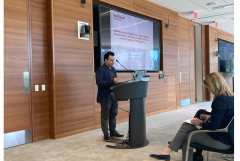Dr. Nikolaos Koundouros, a postdoctoral associate in the Department of Pharmacology at Weill Cornell Medicine, has been awarded a 2025 Tri-Institutional Breakout Award for Junior Investigators.
Weill Cornell Medicine, Memorial Sloan Kettering Cancer Center and The Rockefeller University present the awards to up to six exceptional investigators each year—at least one from each institution—who are recognized for their notable research achievements, impactful findings and high potential for success as independent investigators. Winners receive a $25,000 unrestricted prize.
“I certainly appreciate the honor and significance of this award and know how competitive it is,” said Dr. Koundouros, who is also a Charles H. Revson Fellow in the Sandra and Edward Meyer Cancer at Weill Cornell Medicine. “It will have a huge, positive impact on my career.”
Dr. Koundouros earned his doctorate at the Institute of Cancer Research in London, during which time he helped pioneer the use of a surgical tool called the iKnife that can detect cancer by analyzing tissue chemistry in real time. He also uses advanced tools and techniques to measure how cells break down sugars and fats. His work has fueled the creation of a potential cancer treatment that targets how cells detect nutrients.






